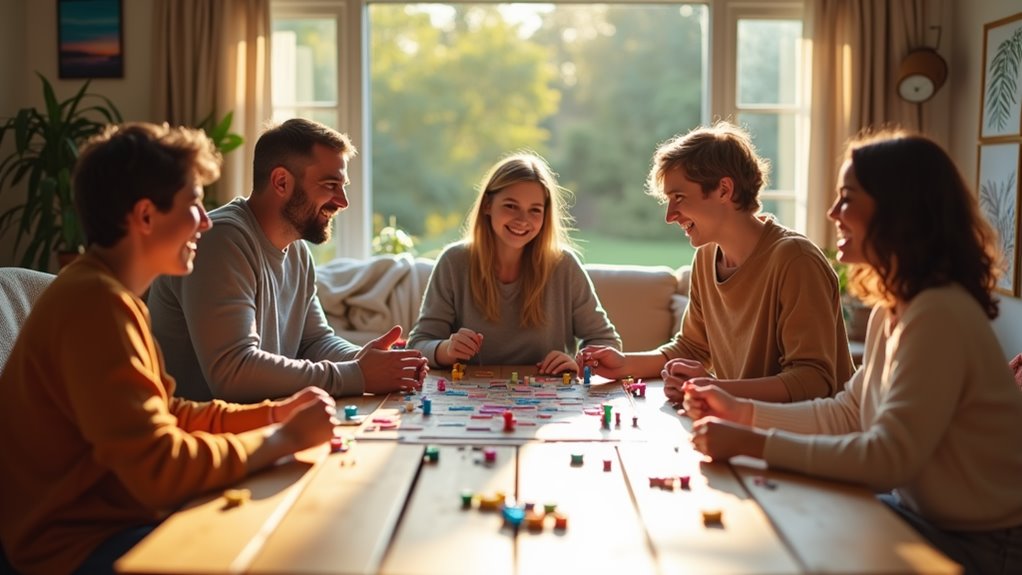Quality family time is like magic for kids' growth! When you spend time together, you're not just having fun; you're also building strong relationships and emotional security. Activities like game nights or outdoor play boost social skills and communication, helping your child express themselves and understand others better. Plus, engaging experiences spark curiosity and cognitive development, turning every moment into a learning opportunity. This nurturing environment helps kids feel valued and respected, greatly affecting their happiness and confidence. So, get ready to create some unforgettable memories—there's a lot more to discover about how all this shapes your child's future!
Importance of Family Time
Family time plays an essential role in a child's development, fostering emotional security and strong relationships. When you spend time together, whether it's playing games, cooking meals, or just talking, you're building a bond that lasts a lifetime. Kids need to know they can count on you, and family time makes that happen.
Imagine a cozy movie night with popcorn and silly faces—those moments help kids feel loved and connected. Plus, it's a great way to create lasting memories! You'll find that sharing experiences helps kids learn important life skills, like teamwork and communication. It's like a secret recipe for happiness!
Don't underestimate the power of family time, even when it feels chaotic. Whether you're maneuvering a board game or tackling a DIY project, each moment is a chance to teach and learn together.
Sure, things might get messy (who hasn't spilled a drink during a game?), but that just adds to the fun! So, embrace the laughter, the little disagreements, and the spontaneous dance parties.
You'll see how those shared moments play a big part in shaping a happy and confident child. After all, family time is where love truly grows!
Emotional Development in Children
Spending quality time together not only strengthens bonds but also plays a significant role in emotional development. When you spend time with your kids, you create a safe space for them to express their feelings. Whether it's sharing a laugh over a silly game or comforting them during a tough moment, these experiences teach children how to manage their emotions. They learn that it's okay to feel happy, sad, or even frustrated.
Engaging in family activities, like cooking dinner or playing board games, encourages kids to share their thoughts and feelings. You're helping them develop empathy by listening and responding to their emotions. Imagine this: when they spill their juice, instead of getting upset, you can laugh it off together, showing them that mistakes happen, and it's all part of life.
Moreover, quality family time boosts their self-esteem. When you show genuine interest in what they say, they feel valued and understood. This sense of security is essential for their emotional growth.
Social Skills Enhancement
Engaging in family activities can really boost your child's social skills. When you spend time together, whether it's playing board games, cooking, or just chatting at the dinner table, your child learns how to interact with others. These moments help them practice sharing ideas, listening, and expressing themselves clearly. Plus, it's a great way to model good behavior!
Think about it: during family game night, your child learns to take turns and handle wins or losses gracefully. They see how you cheer for each other and offer support when things don't go as planned. This builds their confidence and teaches them the importance of teamwork.
Also, when you introduce your child to new friends or family members, they get the chance to practice greeting people and starting conversations. It's like a mini training session for real life!
Cognitive Growth and Learning
Numerous studies show that quality family time greatly boosts cognitive growth and learning in children. When you spend time together playing games, reading books, or even cooking, you're actually helping your child's brain develop.
It's like giving their mind a workout! Engaging in fun activities stimulates their curiosity and encourages them to ask questions.
Think about it: when you're building a LEGO tower, your child's figuring out how to balance pieces and solve problems. That's real learning disguised as play!
Plus, sharing stories can improve their language skills. The more words they hear, the better they communicate.
Don't forget about the power of discussions during family meals. Talking about your day or diving into interesting topics gets their brains buzzing with new ideas.
It's amazing how a simple dinner can turn into a mini-lecture or a science project!
Building Strong Relationships
Often, families that prioritize quality time together build stronger relationships. When you spend time with your kids, you're not just having fun—you're creating a bond that lasts. Shared experiences like game nights or cooking together help everyone feel connected. It's like building a secret clubhouse where only you and your family belong!
These moments allow you to communicate openly. You can talk about your day, share laughs, or even tackle tough topics together. Kids learn to trust you, and you become their go-to person for advice. Plus, it's a great way to show them they matter. When you listen to their stories, no matter how silly, you're saying, "Hey, I care!"
Don't forget, building strong relationships also means making memories. Whether it's a camping trip or just a walk in the park, these experiences become stories to tell later.
And who knows? You might even discover hidden talents along the way—like your kid's amazing ability to roast marshmallows!
In the end, it's all about being there for each other. So, gather the family and start making those special moments. Your relationships will thank you!
Quality vs. Quantity of Time
When it comes to family time, the debate between quality and quantity can feel overwhelming. You might wonder if spending hours together matters more than the fun and connection you create in that time. Well, both aspects play a role in your child's development, but they don't weigh the same.
Quality time is all about being present. When you're focused, engaged, and having genuine conversations, your child feels valued. Think of it like a delicious dessert; a little bit goes a long way!
On the other hand, quantity means simply being together, even if it's in the same room while you're both distracted by screens. Sure, it counts, but it mightn't be as meaningful.
Imagine watching a movie together, but you're scrolling through your phone the whole time. It's like sharing a pizza but forgetting to enjoy the toppings!
So, while it's great to have family dinners or game nights, make sure those moments count. Ultimately, finding a balance between quality and quantity helps your child feel loved and supported.
Shared Experiences and Memories
Shared experiences and memories play an essential role in strengthening family bonds. When you and your family create special moments together, you're not just having fun; you're building a treasure chest of memories. These shared experiences can be anything from a fun game night to a memorable vacation. Each moment you spend together helps your family feel closer.
Think about it: when you look back on your childhood, it's those silly moments, like a kitchen dance party or a camping trip gone wrong, that make you smile the most. These memories stick with you and shape who you are. They teach you about love, laughter, and even a little bit about life's ups and downs.
Plus, having these shared experiences can help you communicate better. When you've laughed together or faced challenges as a family, you learn to support each other more. You're not just a group of people living under one roof; you're a team.
Family Activities That Foster Growth
Engaging in family activities that foster growth not only strengthens bonds but also nurtures personal development. You might be surprised at how simple things can make a big difference.
For instance, cooking together can teach kids about teamwork and healthy eating. Plus, who doesn't love a little kitchen chaos?
Another fun idea is to explore nature as a family. Whether it's hiking in a local park or planting a garden, these activities help kids learn about the environment while creating lasting memories. You'll get some fresh air, too!
Don't forget about game nights! Playing board games or card games can boost problem-solving skills and teach good sportsmanship. And let's be honest, who doesn't enjoy a little friendly competition?
Volunteering together is another great way to grow. Helping others not only teaches empathy but also shows kids the importance of giving back. It's a win-win!
Communication and Connection
Effective communication is essential for building strong connections within a family. When you talk openly and honestly with your family members, it helps everyone feel valued and understood. Think about it: how often do you share your thoughts or feelings? Just a little chat at dinner can make all the difference.
Listening is just as vital! When you really pay attention, you show you care. Kids often feel more connected when they know their parents are truly listening. It's like magic—when you listen, they open up more. And who knows? You might even learn about their favorite video game or the latest trend in school!
Don't forget to use humor, too! A silly joke or a funny story can lighten the mood and bring everyone closer.
Remember, it's not just about the words; it's about the feelings behind them. So, whether you're discussing school, sharing dreams, or just having fun, keep the lines of communication open.
When you connect through communication, you create a loving environment that supports your child's growth and happiness. After all, a family that communicates well, stays strong together!
Role of Play in Development
Play fuels a child's development in countless ways. It's not just fun; it's a crucial part of growing up. When kids engage in play, they're not just having a good time; they're also learning important skills. For example, when you watch your child build a tower with blocks, they're practicing problem-solving and hand-eye coordination. It's like a mini-engineering project, right?
Through play, children explore their creativity. Whether they're pretending to be superheroes or creating their own magical worlds, they learn to express themselves. You might notice that as they play, they also learn how to share, take turns, and resolve conflicts. Who knew playing with dolls could teach so much about friendship?
Moreover, play helps to boost a child's emotional development. When they laugh, cry, or even get a little frustrated during play, they're processing their feelings. It's a great way for them to understand themselves better.
Impact on Behavioral Health
Many parents mightn't realize how essential family time is for a child's behavioral health. When you spend quality time together, you're not just having fun; you're helping your child learn how to manage their feelings and behaviors.
Imagine this: a cozy family game night can teach your kid about teamwork and patience. Plus, it gives them a safe space to express themselves.
When kids feel secure and loved, they're less likely to act out or feel anxious. Family activities, like cooking or hiking, encourage open communication. You might find your child opens up about their day, sharing worries or joys. This connection helps them develop emotional intelligence, which is super important!
Moreover, consistent family time can reduce stress for both you and your child. It's like a mini-vacation from the hustle and bustle of everyday life.
When everyone's relaxed and laughing together, it creates a positive atmosphere that encourages good behavior.
Long-term Benefits of Family Time
Consistent family time not only nurtures a child's immediate emotional well-being but also lays the groundwork for long-term benefits that can shape their future. When you spend quality time together, you're helping your child develop strong communication skills. They learn how to express their feelings and listen to others, which is super important as they grow.
Plus, those family moments create cherished memories that boost their sense of belonging. Think about it: kids who feel close to their families often have better self-esteem. That confidence can help them tackle challenges in school and life.
And let's not forget about problem-solving skills! When you work together on puzzles or cooking, they learn to think critically and collaborate. As they grow older, the lessons learned during family time don't just fade away. They stick around, helping your child handle friendships, schoolwork, and even tough situations.





